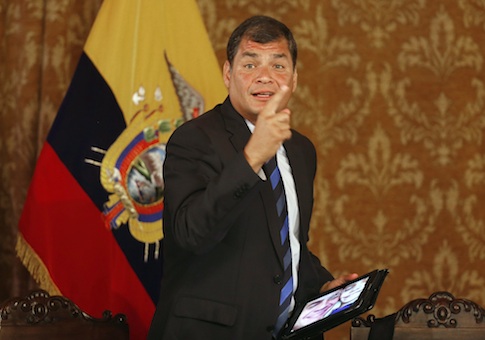UPDATE 12:30 P.M.: A spokesperson at MIT said Correa would join the school’s leadership for "private meetings" on April 9. MIT President Rafael Reif received an electrical engineering degree in Venezuela and later served as an assistant professor at a university in Caracas.
_
Ecuador President Rafael Correa—who has been widely criticized for his anti-American rhetoric and domestic crack down on press freedoms—will speak at Harvard University next month, the Washington Free Beacon has confirmed.
Local Ecuadorian media last week first reported that Correa would be speaking at Harvard, Yale University, and the Massachusetts Institute of Technology (MIT) during the second week of April. Reports also said he would deliver his weekly radio and television address "Citizen Link" from New York.
A Harvard spokesperson told the Free Beacon that Correa will address the John F. Kennedy Jr. Forum at Harvard’s Institute of Politics on April 9 at 6 p.m. The forum is subject to a ticket lottery and will be streamed online. The topic of his address has not yet been determined and the school will not compensate him.
Correa’s potential talks at Yale and MIT could not be confirmed by press time. School spokespersons did not respond to multiple inquiries.
Correa, a fiery populist leader, presents his governing agenda as a new form of "21st century socialism." However, critics say his rule resembles former longtime Venezuelan strongman Hugo Chavez: altering the constitution to enhance his powers, fending off allegations of corruption, and silencing dissenters.
Carlos Eire, a history and religious studies professor at Yale who has also written books about Cuba, said in an interview that he doubts students attending Correa’s address will know much about him.
Eire said he believes Correa aims to assume leadership of Latin America’s ALBA group, a bloc of socialist countries founded by Venezuela and Cuba. Chavez, a close partner of the Castro brothers in Cuba, used Venezuela’s immense oil reserves to spread his influence throughout the region.
"It’s like a cancer spreading from Cuba to Venezuela," he said. "Now there’s hardly any country in Latin America that is not going in that direction."
"They’re all heading toward this kind of ‘21st century socialism,’ and one of its features is that the state controls the media—it’s very Orwellian," he added.
Ecuador’s National Assembly—which is dominated by Correa’s Alianza-PAIS party—approved a communications law last year that press advocates say is one of the most repressive in the region. Journalists who engage in "deliberate omission of … topics of public interest" or "media lynching" face civil or criminal penalties under the law.
Ecuador’s media oversight agency invoked the law in February to fine leading newspaper El Universo and order that it "correct" a critical cartoon.
The cartoon depicted an overnight raid by police on the home of Fernando Villavicencio, an investigative journalist and adviser to an opposition politician who previously told the Free Beacon that the agents stole documents involving alleged corruption by government officials. Correa called the cartoonist an "ink assassin."
Correa has expressed support for Venezuela President Nicolas Maduro as he attempts to quell protests against his rule that have left more than 30 dead. Demonstrators accuse Maduro of ordering pro-government militias to kill them and censoring media coverage of the protests.
Jose Cardenas, a former National Security Council staffer in the George W. Bush administration and an expert on Latin America, said in an interview that Correa’s record stands in stark contrast to academic ideals of tolerance and free expression.
"For the university I mean my goodness—hosting somebody whose record on respect for freedom of speech and freedom of the press back home has been so negative," he said. "What [Correa] should be doing is debating somebody from the press."
Doug Gavel, director of media relations at Harvard, told the Free Beacon that a fundamental tenet of Harvard’s Kennedy School is the "free exchange of ideas."
"In keeping with that educational mission, the school has a long and proud tradition of providing a venue for leaders from around the world to speak to and interact with the community on important public policy issues," he said. "The unique opportunity to engage in direct discussion with a head of state is one that many of our students value greatly, even if they may disagree on some policy positions."
Correa has maintained high public approval ratings in Ecuador, mostly due to social spending and infrastructure projects financed by oil revenue.
Still, accusations of corruption and hypocrisy continue to dog his administration.
Correa has long pursued a multi-billion dollar judgment against oil company Chevron for alleged pollution that occurred in Ecuador’s Lago Agrio region. A U.S. federal judge ruled earlier this month that the judgment could not be enforced in America because the plaintiffs’ attorneys bribed a judge in Ecuador, ghostwrote purportedly neutral scientific studies, and conspired to break the law.
Correa in December dissolved a nongovernment organization protesting state oil drilling in the Amazon. He previously called the Free Beacon "corrupt" for reporting on the Chevron case.
Steven Donziger, the lead attorney now implicated in the allegedly fraudulent Chevron case, will also speak at Harvard Law School on April 9. He has appealed the federal court ruling.
Correa has also emulated Chavez by frequently decrying the alleged "imperial" influence of the United States in Latin America. He has expelled an American ambassador, shut down a joint U.S. anti-drug base, and granted asylum to WikiLeaks founder and privacy advocate Julian Assange despite allegations that Correa’s government has spied on reporters.
Correa earned a PhD in economics at the University of Illinois, where he wrote a doctoral thesis criticizing Latin America’s policies of economic liberalization in the 1990s.
